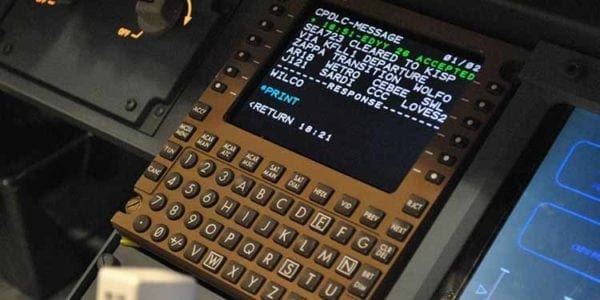
All 20 FAA Air Route Traffic Control Centers (ARTCC) are to receive Data Comm by 2021, an equipage that could significantly reduce controller workloads in de-conflicting airspace, an issue cited by the U.S. Office of Special Counsel at the Jacksonville ARTCC. Pictured is a cockpit display with Data Comm, part of the FAA’s enroute controller-to-pilot data link communications (CPDLC) modernization initiative. (Collins Aerospace Photo)
The Federal Aviation Administration (FAA) said on Nov. 20 that it is reviewing a U.S. Office of Special Counsel (OSC) letter on inadequate de-confliction of airspace at the Jacksonville Air Route Traffic Control Center (ARTCC).
A whistleblower, who works as an air traffic controller at Jacksonville ARTCC, alerted the FAA in 2017 to a violation of agency procedures by some controllers there regarding de-confliction of airspace, and in February, 2018, the FAA instituted a change to Standard Operating Procedures (SOPs) at the ARTCC, according to OSC.
The FAA substantiated the whistleblower’s allegations in a report issued on Sept. 10 but says that the changes the agency made to SOPs at the Jacksonville ARTCC comply with FAA altitude separation standards.
“The procedures in use today at the Jacksonville Air Route Traffic Control Center are consistent with those in place at facilities throughout the National Airspace System and comply with all FAA altitude separation standards,” according to an FAA email response to questions from Avionics International. “The FAA is reviewing the conclusions of the Office of Special Counsel and will address each finding in detail.”
The September report by the FAA Office of Audit and Evaluation (AAE) said that “a review of data from February 2016 to June 2018 provided by [Jacksonville ARTCC] documents at least 43 instances where coordination required was not performed for aircraft transiting the Lake City/Lawtey sectors.”
“Specifically, the required coordination did not occur in situations where an aircraft is assigned an Inappropriate Altitude for Direction of Flight (IAFDOF),” the report said. “Controllers from the Perry/Micanopy and Mayo sectors are not calling via landline to initiate an Approval Request (APREQ) from controllers working other sectors. Additionally, based on information including flight strips and Falcon radar and audio replays provided by the whistleblower, we identified 20 events from February to July 2018, and 10 events between June and July 2018, in which required coordination did not occur.”
The report recommended a Safety Risk Management review of the February 2018 change to SOPs at the Jacksonville ARTCC and a new manager for the Jacksonville ARTCC to hold controllers accountable for their performance and actions. On Oct. 4, Transportation Secretary Elaine Chao informed OSC that the Air Traffic Organization would conduct an SRM within a month and confirmed a detail in the report that the ATO had replaced the acting air traffic manager of Jacksonville ARTCC “with a new, permanent manager” in August.
The OSC found that the change to the SOPs by Jacksonville ARTCC in February last year does not rectify the increased possibility of a mid-air collision.
“Rather than address controllers’ noncompliance with the rules, ARTCC managers implemented a change in standard operating procedures (SOPs) that is creating potentially hazardous air traffic conditions,” OSC said this week. “FAA found that the change in SOPs creates a safety hazard by moving aircraft dangerously close to one another at the same altitude. This deviation gives controllers very little time and space to react and prevent a possible collision. For its investigation, FAA interviewed several supervisors and controllers, all of whom stated that the SOP change was ‘hazardous’ or ‘introduced risk.’ The supervisors of the affected sectors stated they had no knowledge or involvement in the SOP change until its implementation.”
Special Counsel Henry Kerner said that “FAA management has failed to take appropriate corrective action.”
“The Safety Risk Management process is not merely an exercise in completing forms,” he said. “It involves a critical safety analysis to identify and mitigate hazards posed by air traffic procedures. Every supervisor and controller interviewed by FAA stated that the SOP change is hazardous or introduces risk, yet FAA continues to use these procedures without modification. We urge FAA to reconsider its position and take immediate corrective action.”
OSC said that its finding that the FAA’s actions thus far were not reasonable is “a relatively small percentage of the whistleblower disclosure cases we close.”